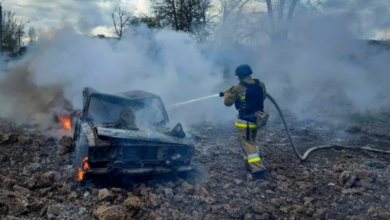Paris overwhelmed by stench of rubbish after bin men join pension protest strike

Stink is filling the air of Paris with 5,400 tonnes of rubbish left on the streets after rubbish collectors joined the strike against Emmanuel Macron’s pension reforms.
In some arrondissements, heaping piles of rubbish bags left to rot outside are forcing pedestrians to step off the sidewalk and walk onto the roads, and are also drawing out scavenging rodents that have grown bolder over the last few days.
Instead of spring blossoms, the air is sweet with a sickly smell of stewing fumes, particularly in areas dense with restaurants and cafes. And visiting tourists are having to get creative at reframing their Parisian vacation pictures for rubbish-free shots.
Along with rubbish collectors, the city’s three main garbage incinerators have also shut down in protest, exacerbating the situation.
Half of Paris’s garbage is collected by the city, while the other half is contracted out to private companies.
In a letter to the Paris mayor Anne Hidalgo, Jean-Pierre Lecoq, the mayor of the 6th arrondissement, said that though he doesn’t begrudge the garbage collectors’ right to strike, the situation has become a health hazard and needs to be resolved.
“The crisis that we have experienced recently requires us to exercise caution,” he said in the statement.

The French Senate voted in favour of president Emmanuel Macron’s controversial pensions reforms late Saturday, clearing one of the last parliamentary hurdles before its final vote this week.
Just hours after French demonstrators took to the streets for the seventh day of national protests, the Senate, which is dominated by the Right-wing Republicans, voted 195-112 for Mr Macron’s reforms. The proposal would raise the age of retirement from 62 to 64 and require citizens to have acquired 43 years of work in order to access a full state pension.
“An important step was taken this evening with a broad vote on the text of the pension reform in the Senate,” Elisabeth Borne, the prime minister, said in an interview with AFP.
“Despite the attempts at obstruction by certain groups, the democratic debate was held. I am sure that there is a majority in parliament to vote for this text.”
Compared to the national strike organised on March 7, which drew between 1.28 million to 3.5 million people to the streets (according to figures from the Ministry of the Interior and unions respectively), Saturday’s protests attracted far fewer crowds.
Across France, 230 protests saw between 368,000 to one million people participate in organised marches.
On Wednesday, the Bill will be examined by a joint committee of senators and MPs from different parties who will have one day to agree to a common text at a closed-door meeting.
The Bill will then go back to the Senate for a final vote Thursday morning where it’s expected to pass handily among its Republican-dominated majority, before returning to the National Assembly where MPs will cast the final decisive vote — and where the Bill faces strong opposition.
The spectre of defeat has raised concerns among unions and the opposition that Ms Borne could trigger article 49.3 of the constitution which allows the government to pass a bill directly without a vote.
In an interview with the Journal du Dimanche published Sunday, Laurent Berger, head of the moderate trade union CFDT, warned that forcing through the deeply unpopular pension reform with article 49.3 would be “incredible and dangerous”.







